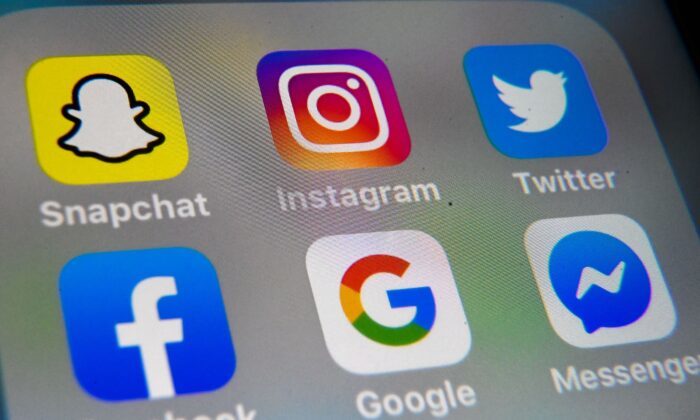1. House Republicans Outline Their Antitrust Agenda for Tech Giants
2. 36 states, D.C. sue Google for alleged antitrust violations in its Android app store
1. House Republicans Outline Their Antitrust Agenda for Tech Giants
Lead Republican on the House Judiciary Committee, Jim Jordan (R-Ohio), and his fellow GOP Representatives on Wednesday laid out their framework for reining in Big Tech companies’ control over the public discourse.
🚨ONLY 15 CENTS per day lets you see ALL posts, make your OWN posts, comment, and reply! PLUS, 100% of your gift/subscription is donated to The America Project which is Funding The Audits! Subscribe or Give Once here ➡ https://patrickbyrne.locals.com/support
The document outlined steps to rein in Big Tech and end their practices that have resulted in the infringement on the free speech of Americans. The proposal comes a couple of weeks after the House Judiciary Committee voted to advance six bipartisan antitrust bills.
Chairman Jerry Nadler (D-N.Y.) praised the passage of the bills. “By reining in anti-competitive abuses, our legislation ensures there is a space for opportunity and innovation to thrive online,” Nadler said.
But Jordan said he does not believe the anti-trust legislation will bring benefit to Americans or protect free speech.
He said the bills advanced by the Judiciary Committee do not address tech monopolies and free speech issues, and instead give Congress the power to regulate Big Tech Companies, making the government more powerful.
“I think what these bills do, very clearly, is they marry up big government with big tech, and I think it’s going to make the situation worse,” Jordan told Fox News last month.
The Ohio congressman said that he only supported a couple of the bills in the package, and that the package “as a whole, is bad and most of the legislation in the package, certainly for these bills, [are] very problematic.”
“Democrats want to use the power of the regulatory state the power of big government, particularly the Biden administration to further control the economy and limit speech,” he said.
“The empowerment they give to the Federal Trade Commission to run companies, and the one bill has secret committees that aren’t subject to any type of transparency.
“What we need to do is take away their liability protection and break them up, two simple things. That’s what Republicans are going to focus on doing,” he added of where the GOP bills differ. “We’ve introduced that first piece of legislation last week as well. So that’s where we need to go, but I don’t think Democrats want the same objective that you do, your viewers do, and most of America does.”
Jordan and Republican lawmakers say conservatives are a target of Big Tech censorship and bias, and their framework will help create laws that will hold Big Tech accountable.
The Republican proposal is divided into three key parts: speed, accountability, and transparency.
By speed, the GOP members proposed requiring a faster process for hearing antitrust cases against Big Tech and empowering Attorney Generals to use fast-track anti-trust cases.
Under accountability, Republicans are seeking to reform tech’s protection from legal liability for content on its platforms under Section 230. They also want to create a statutory basis for Americans to directly challenge Big Tech in court for any censorship they experience. The GOP congress members also want to consolidate antitrust enforcement within the Department of Justice so that it is more effective and accountable.
The framework will require that large platforms list clearly and openly content moderation decisions and rules for censorship on a publicly available website. Failure to do so would result in a huge fine.
In a letter to House Republicans, leader Kevin McCarthy said the framework is only a starting point from which legislation will be written and introduced.
“We will work with our members, committees, and newly formed task forces to turn this framework into legislation, and we will fight for floor consideration. Conservatives and our ideas have been targeted by Big Tech for too long. We must step up because make no mistake, the Democrats continue to demonstrate no interest in addressing fairness when it comes to conservative viewpoints. And they’ll continue to use Big Tech to do so,” he wrote.
From theepochtimes.com/house-republicans-outline-their-antitrust-agenda-for-tech-giants_3891580.html
2. 36 states, D.C. sue Google for alleged antitrust violations in its Android app store. A group of 36 states and Washington, D.C., filed a lawsuit against Google on Wednesday targeting the tech giant’s control of its Android app store.
Eight states — Arizona, Colorado, Iowa, Nebraska, New York, North Carolina, Tennessee and Utah — are leading the antitrust suit, which was filed in California federal court, Politico reported.
The lawsuit challenges Google’s plan to force all app developers who use the Google Play Store to pay a 30 percent commission on sales of digital goods or services.
It is the first to challenge Google’s control in the mobile app store market and will be heard by U.S. District Judge James Donato of the Northern District of California, an appointee of former President Barack Obama.
The states and D.C. — which have a mix of Republican and Democratic leaders — said Google has a monopoly in the market for distributing apps on the Android operating system, controlling 90 percent of the market.
The lawsuit said Google favors its Play Store and gives developers “no reasonable choice” but to distribute through it, The Washington Post reported.
“Google has taken steps to close the ecosystem from competition and insert itself as the middleman between app developers and consumers,” the states’ attorneys general said.
The states said Google’s control has harmed consumers and app developers, especially as it plans to take a commission for in-app purchases.
“Google has served as the gatekeeper of the internet for many years, but, more recently, it has also become the gatekeeper of our digital devices — resulting in all of us paying more for the software we use every day,” New York Attorney General Letitia James said in a statement.
“Once again, we are seeing Google use its dominance to illegally quash competition and profit to the tune of billions,” she said. “Through its illegal conduct, the company has ensured that hundreds of millions of Android users turn to Google, and only Google, for the millions of applications they may choose to download to their phones and tablets.”
Arizona Attorney General Mark Brnovich also issued a statement, saying, “I have always prioritized consumer privacy and holding big tech companies accountable. Google’s conduct not only stifles competition and innovation, but it also costs Android users and app developers more money. Arizona and the coalition are fighting to protect consumers and to make sure everyone plays by the rules.”
Google dismissed the lawsuit as “meritless” in a blog post and said the changes the plaintiffs want risk “raising costs for small developers, impeding their ability to innovate and compete, and making apps across the Android ecosystem less secure for consumers.”
“This lawsuit isn’t about helping the little guy or protecting consumers,” said Wilson White, Google’s senior director of public policy.
“It’s about boosting a handful of major app developers who want the benefits of Google Play without paying for it.”
Google’s Play Store is the default app store on Android phones, but users can download apps from other stores and install them from other sources, according to Politico.
Google’s current policy requires app developers to use its payment system for app purchases made through the Play Store, though it hasn’t enforced the rule very strongly in the past.
The Big Tech company said it would start enforcing the rules in September, leading to an uproar from companies.
Google said it would drop commission for sales to 15 percent, but only on the first $1 million generated by the app developer, The Post reported.
The state attorneys general argue that the commission is “extravagant” and will result in a market in which Google has an unfair advantage.
This article appeared originally on The Western Journal.
From thegatewaypundit.com/2021/07/whopping-36-states-dc-sign-onto-major-antitrust-suit-google/



















